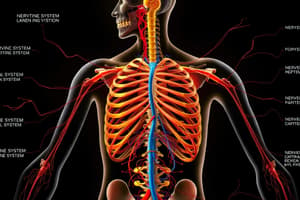Podcast
Questions and Answers
What is the primary role of insulin secreted by the pancreas?
What is the primary role of insulin secreted by the pancreas?
- To regulate the inflammatory response during infections.
- To maintain blood sugar levels and aid in food digestion. (correct)
- To control involuntary muscle movement in the digestive system.
- To signal the brain when the stomach is full.
How does the medulla oblongata contribute to the digestive process?
How does the medulla oblongata contribute to the digestive process?
- By stimulating the release of hormones that regulate appetite.
- By producing enzymes that break down food in the stomach.
- By controlling involuntary muscle movements that aid in the digestion of food. (correct)
- By sending signals to the brain indicating satiety.
Which of the following describes the relationship between the nervous system and hormone release?
Which of the following describes the relationship between the nervous system and hormone release?
- Hormones directly stimulate nerve impulses that control muscle movement.
- Hormones inhibit the transmission of signals in the nervous system to maintain balance.
- The nervous system relies on hormones to transmit signals throughout the body.
- The brain sends signals to glands, triggering the release of hormones. (correct)
What is the role of white blood cells in defending the body?
What is the role of white blood cells in defending the body?
What role do hormones play in bone growth and development?
What role do hormones play in bone growth and development?
How do nutrients from the mother's food supply reach the developing embryo?
How do nutrients from the mother's food supply reach the developing embryo?
What is the significance of the brainstem in relation to the circulatory system?
What is the significance of the brainstem in relation to the circulatory system?
How does the acid in the stomach contribute to the body's defense mechanisms?
How does the acid in the stomach contribute to the body's defense mechanisms?
What is the role of the immune system in the context of inflammatory responses?
What is the role of the immune system in the context of inflammatory responses?
How does the pelvis contribute to the development of a fetus?
How does the pelvis contribute to the development of a fetus?
Flashcards
Nervous system triggers hormones
Nervous system triggers hormones
The brain sends signals to the glands which trigger hormones to be released.
Adrenaline effect on pupils
Adrenaline effect on pupils
The release of adrenaline by the adrenal glands causes the pupils of the eye to dilate.
Brainstem's role in heart rate
Brainstem's role in heart rate
The brainstem controls heart rate.
Hormones influence
Hormones influence
Signup and view all the flashcards
Reproductive System
Reproductive System
Signup and view all the flashcards
Hormones impact on bones
Hormones impact on bones
Signup and view all the flashcards
Digestive System signals the brain
Digestive System signals the brain
Signup and view all the flashcards
Acid's role in digestion
Acid's role in digestion
Signup and view all the flashcards
White blood cells transport
White blood cells transport
Signup and view all the flashcards
Calcium for Bones
Calcium for Bones
Signup and view all the flashcards
Study Notes
- The brain sends signals to glands, triggering hormone release, linking the nervous and endocrine systems.
- The brain stem controls heart rate via the nervous system.
- Adrenaline release by adrenal glands dilates eye pupils, which is part of the endocrine system.
- Blood carries hormones throughout the body in the circulatory system, interacting with the endocrine system.
- Medulla in the brainstem controls involuntary muscle movement to help breakdown food as part of the digestive system.
- Blood carries digested nutrients to body cells in the circulatory and digestive systems.
- The brain controls mating behavior via the reproductive system.
- Nutrients diffuse through the placenta to the embryo through blood vessels in the umbilical cord involving the reproductive and circulatory system.
- The brain can stimulate defense mechanisms against infections involving the immune system.
- Stomach acid protects against food-borne pathogens through the digestive system.
- The immune system's white blood cells attack pathogens and are transported through vessels.
- Digestive system signals the brain when the stomach is full.
- Hormones affect brain development and sexual behavior.
- The pancreas secretes insulin to maintain blood sugar levels and enzymes for digestion.
- Hormones from the reproductive system control sexual development.
- Hormones are released to cause bones to grow longer, linking the endocrine and skeletal systems.
- Calcium ingested can strengthen bones, connecting the skeletal and digestive systems indirectly.
- Hormones regulate the menstrual cycle.
- Nutrients from food are essential for the embryo's development.
- The mother's system can attack the fetus due to blood type differences linking to the immune and reproductive systems.
- The pelvis protects a developing fetus from injury.
- This system produces white blood cells to defend the body.
- Hormones help suppress the inflammatory response when pathogens invade.
- The brain regulates bone position by controlling muscles.
Studying That Suits You
Use AI to generate personalized quizzes and flashcards to suit your learning preferences.




